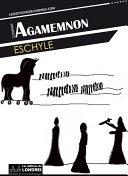ἄνδρες γὰρ ἑπτά, θούριοι λοχαγέται,
ταυροσφαγοῦντες ἐς μελάνδετον σάκος
καὶ θιγγάνοντες χερσὶ ταυρείου φόνου,
Ἄρη τ’, Ἐνυώ, καὶ φιλαίματον Φόβον
ὡρκωμότησαν ἢ πόλει κατασκαφὰς
θέντες λαπάξειν ἄστυ Καδμείων βίᾳ,
ἢ γῆν θανόντες τήνδε φυράσειν φόνῳ
grc
Le serment des sept chefs argiens contre Thèbes, décrit à Étéocle par un Messager.
Les Sept contre Thèbes
Œuvres
Les Euménides
EschyleEschyle citations célèbres
“Zeus! … quel que soit son vrai nom, si celui-ci lui agrée, c'est celui dont je l'appelle.”
Ζεύς, ὅστις ποτ’ ἐστίν, εἰ τόδ’ αὐ-
τῷ φίλον κεκλημένῳ,
τοῦτό νιν προσεννέπω.
grc
Invocation à Zeus pendant la parodos (entrée du Chœur sur scène)
L'Orestie, Agamemnon
ἄπειρον ἀμφίβληστρον, ὥσπερ ἰχθύων,
περιστιχίζω, πλοῦτον εἵματος κακόν
grc
Clytemnestre raconte le piège qu'elle a tendu à son époux Agamemnon pour le tuer.
L'Orestie, Agamemnon
τῶν τοι ματαίων ἀνδράσιν φρονημάτων
ἡ γλῶσσ’ ἀληθὴς γίγνεται κατήγορος.
grc
Étéocle réagissant aux propos impies de Capanée, l'un des sept chefs assaillant Thèbes, que lui rapporte le Messager.
Les Sept contre Thèbes
ἄρασσε μᾶλλον, σφίγγε, μηδαμῇ χάλα·
δεινὸς γὰρ εὑρεῖν κἀξ ἀμηχάνων πόρον.
grc
Le dieu Pouvoir (Kratos) conseille Héphaïstos pendant que ce dernier enchaîne Prométhée au mont Caucase.
Prométhée enchaîné
grc
La déesse Athéna instaure le tribunal de l'Aréopage à Athènes afin de trancher le conflit entre Apollon et les Erinyes au sujet de la culpabilité ou de l'innocence d'Oreste (la mère d'Oreste, Clytemnestre, ayant tué son époux Agamemnon, Oreste a tué Clytemnestre, commettant ainsi un matricide pour venger son père).
L'Orestie, Les Euménides
Eschyle: Citations en anglais
“Better to die on your feet than live on your knees.”
This is usually attributed to Emiliano Zapata, but sometimes to Aeschylus, who is credited with expressing similar sentiments in Prometheus Bound: "For it would be better to die once and for all than to suffer pain for all one's life".
Misattributed
Source: Prometheus Bound, lines 510–524, as translated by R. Potter (1860)
“Do not kick against the pricks.”
Source: Oresteia (458 BC), Agamemnon, line 1624
“Words are the physicians of a mind diseased.”
Source: Prometheus Bound, line 378; compare: "Apt words have power to suage / The tumours of a troubl'd mind", John Milton, Samson Agonistes.
Variant translations:
Zeus has led us on to know,
the Helmsman lays it down as law
that we must suffer, suffer into truth.
We cannot sleep, and drop by drop at the heart
the pain of pain remembered comes again,
and we resist, but ripeness comes as well.
From the gods enthroned on the awesome rowing-bench
there comes a violent love.
Robert Fagles, The Oresteia (1975)
God, whose law it is
that he who learns must suffer.
And even in our sleep, pain that cannot forget
falls drop by drop upon the heart,
and in our own despite, against our will,
comes wisdom to us by the awful grace of God.
Edith Hamilton, The Greek Way (1930), pp. 61 and 194 ( Google Books https://books.google.com/books?id=D3QwvF3GWOkC&lpg=PA61&ots=BacvHvGm6e&dq=%22And%20in%20our%20own%20despite%2C%20against%20our%20will%2C%20Comes%20wisdom%22%20-kennedy&pg=PA194#v=onepage&q=%22our%20own%20despite%22&f=false)
Robert F. Kennedy quoted these lines in his speech announcing the assassination of Martin Luther King, Jr. on 4 April 1968. His version http://www.americanrhetoric.com/speeches/rfkonmlkdeath.html:
Even in our sleep, pain which cannot forget
falls drop by drop upon the heart
until, in our own despair, against our will,
comes wisdom through the awful grace of God.
Variant translations of πάθει μάθος:
By suffering comes wisdom.
The reward of suffering is experience.
Wisdom comes alone through suffering.
Source: Oresteia (458 BC), Agamemnon, lines 176–183, as translated by Ian Johnston ( Google Books https://books.google.com/books?id=qz1HpBZ1fTwC&lpg=PA13&ots=C7aohrZRF1&dq=Drips%20in%20our%20hearts%20as%20we%20try%20to%20sleep%2C&pg=PA13#v=onepage&q=Drips%20in%20our%20hearts%20as%20we%20try%20to%20sleep,&f=false)
“On me the tempest falls. It does not make me tremble.”
Source: Prometheus Bound, line 1089
Contexte: On me the tempest falls. It does not make me tremble. O holy Mother Earth, O air and sun, behold me. I am wronged.
“Destiny waits alike for the free man as well as for him enslaved by another's might.”
Source: Oresteia (458 BC), The Libation Bearers, line 103
“Know'st thou not well, with thy superior wisdom, that
On a vain tongue punishment is inflicted?”
Source: Prometheus Bound, lines 328–329 (tr. Henry David Thoreau)
“Therefore, while thou hast me for schoolmaster,
Thou shalt not kick against the pricks.”
Source: Prometheus Bound, lines 322–323 (tr. G. M. Cookson)
“The will of Zeus,
The hand of his Hephæstus.”
Source: Prometheus Bound, line 619 (tr. Elizabeth Barrett Browning)
“The guardian of poor suffering mankind.”
Source: The Suppliants, lines 382–383 (tr. Christopher Collard)
“Arrogance in full bloom bears a crop of ruinous folly from which it reaps a harvest all of tears.”
Source: The Persians (472 BC), lines 821–822 (tr. Christopher Collard)
“Chorus of Furies: Living, you will be my feast, not slain at an altar”
Source: Oresteia (458 BC), Eumenides, line 305 (tr. Herbert Weir Smyth)
“Thou shalt learn,
Late though it be, the lesson to be wise.”
Source: Oresteia (458 BC), Agamemnon, line 1425 (tr. E. H. Plumptre)
“Repute of justice, not just act, thou wishest.”
Source: Oresteia (458 BC), Eumenides, line 430 (tr. Anna Swanwick)
“I think the slain care little if they sleep or rise again.”
trans. https://archive.org/stream/agamemnonofaesch015545mbp/agamemnonofaesch015545mbp#page/n38/mode/1up Gilbert Murray
Oresteia (458 BC), Agamemnon
“His resolve is not to seem, but to be, the best.”
Source: Seven Against Thebes (467 BC), line 592; compare: esse quam videri.
“Innumerable twinkling of the waves of the sea.”
Source: Prometheus Bound, line 89
“May Morning, as the proverb runs, appear
Bearing glad tidings from his mother Night!”
Source: Oresteia (458 BC), Agamemnon, lines 264–265 (tr. E. H. Plumptre)
“Children are memory's voices, and preserve
The dead from wholly dying.”
Source: Oresteia (458 BC), The Libation Bearers, lines 505–506 (tr. E. D. A. Morshead)
“I say that oaths shall not enforce the wrong.”
Source: Oresteia (458 BC), Eumenides, line 432 (tr. E. D. A. Morshead)
“Oh me, I have been struck a mortal blow right inside.”
Source: Oresteia (458 BC), Agamemnon, line 1343
Source: Oresteia (458 BC), The Libation Bearers, lines 600–601 (tr. Anna Swanwick)
“Good fortune is a god among men, and more than a god.”
Variant translation: Success is man's god.
Source: Oresteia (458 BC), The Libation Bearers, line 59


